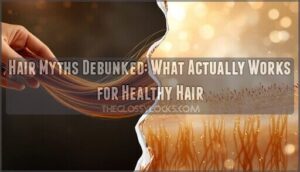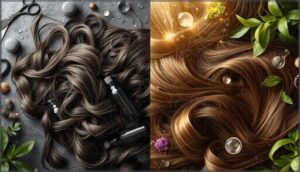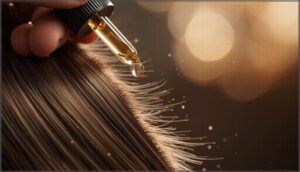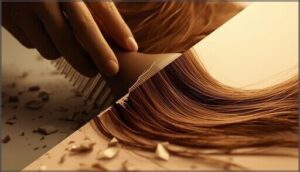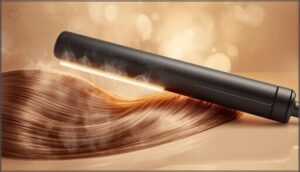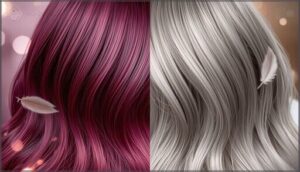This site is supported by our readers. We may earn a commission, at no cost to you, if you purchase through links.
Your grandmother swore by brushing 100 strokes a day. Your best friend insists cutting hair makes it grow faster. Meanwhile, that influencer’s telling you to avoid oils at all costs.
Here’s the kicker: they’re all wrong. Hair myths spread faster than facts because they sound logical—trim those ends to boost growth, stress turns you gray overnight, pluck one gray hair and three show up to its funeral.
But your hair doesn’t work like that. The truth is, most of what you’ve heard about hair care is built on decades of misunderstanding how follicles actually function. Once you separate the science from the nonsense, taking care of your hair gets a whole lot simpler—and way more effective.
Table Of Contents
- Key Takeaways
- Common Hair Myths Debunked
- Hair Growth and Maintenance Myths
- Hair Damage and Repair Misconceptions
- Hair Care Product and Treatment Myths
- Myths About Hair Color and Texture
- Frequently Asked Questions (FAQs)
- What are some hair-related myths?
- Why is there hairfall and no regrowth?
- Why are there so many hair care myths?
- What are some myths about hair growth?
- What is the biggest hair myth?
- What is the mystical significance of hair?
- What does our hair symbolize?
- What is my hair telling me about my health?
- What is the belief of long hair?
- Does washing hair in rice water help growth?
- Conclusion
Key Takeaways
- Cutting your hair doesn’t speed up hair growth—follicles at your scalp control the rate (about 0.5 inches monthly), not the ends you’re snipping off.
- Over-brushing causes breakage and stress, not shine—aim for 10-20 gentle strokes instead of that outdated 100-stroke myth your grandma swore by.
- Once hair is damaged (split ends, breakage), you can’t repair it with products—prevention through heat protectants, gentle handling, and regular trims is your only real defense.
- Stress can actually turn hair gray by destroying pigment-making stem cells in your follicles, and once those cells are gone, that color isn’t coming back.
Common Hair Myths Debunked
Let’s blow up some of the biggest hair myths that have been holding you hostage for way too long. You’ve probably heard these lies from your grandma, your hairstylist, or that one friend who swears they know everything about hair care.
One of the worst offenders? The idea that you can magically speed up growth overnight—but if you’re curious about what actually works, check out these overnight hair growth remedies backed by science.
Time to separate fact from fiction and finally understand what’s really going on with your hair.
Cutting Hair and Growth Rate
Let’s shatter this classic hair myth right now! Cutting your hair doesn’t make it grow faster—your follicles drive growth patterns from the scalp, not the ends.
Here’s what actually matters for hair growth and maintenance:
- Hair grows about 0.5 inches monthly regardless of cutting frequency
- Trimming prevents split ends and breakage, preserving length
- Follicle health and scalp maintenance determine actual growth rate
- Regular hair care beats frequent cuts for healthy growth
Plucking Gray Hairs
You’ve heard it before: pluck one gray hair, and two grow back! Total fiction. Hair pigmentation works at the follicle level—each one acts solo.
Plucking risks follicle damage and scarring, not gray regrowth multiplication. Sure, gray hairs will return from that same spot, but you won’t magically sprout extras.
For more insight into the effects of plucking gray hair, consider expert recommendations before taking action. For smarter gray hair removal, trim with scissors or embrace those silvers!
Brushing 100 Strokes a Day
The “100 strokes a day” hair myth? Pure nonsense! Over-brushing stresses your strands and causes breakage, not glossy locks.
Your gentle detangling methods and brushing frequency depend on your hair type—coarse or curly hair tolerates light passes, while fine hair rebels fast.
Smart daily brushing routine? Try 10–20 deliberate strokes with proper hair brush types. Focus on brush stroke technique, not hitting some magical number!
For details on proper gentle brushing techniques, experts agree that less is often more for healthy hair.
Shampooing Frequency Myths
How often should you actually shampoo? The hair myths around daily washing are wild! Some say skip days for scalp balance, others insist daily cleansing routines are essential.
Truth is, your hair porosity and lifestyle dictate your washing techniques. Oily scalps might need daily shampoo; dry or curly textures thrive washing every 2–3 days. Product residue builds up regardless, so find your sweet spot for ideal hair health and hair care!
If you have low porosity hair, you might wonder whether Shea Moisture’s Coconut & Hibiscus line works for your texture—it’s a common question worth exploring.
Going Outside With Wet Hair
Think going outside with wet hair will give you a cold? That’s one of the biggest hair myths out there! Viruses cause illness, not damp strands.
But cold weather does create scalp comfort issues—evaporation chills your head fast. Wind protection matters too, since wet hair risks more breakage and tangling. For hair health and hair hygiene, towel-dry first or grab a hat for exceptional hair care!
Hair Growth and Maintenance Myths
You want long locks—but the advice you’re following might actually be holding you back. Hair growth myths are everywhere, and they’re confusing the heck out of people who just want healthy hair.
Let’s break down what actually works and what’s complete nonsense.
Trimming and Hair Growth
Snipping your ends won’t turbocharge growth—that’s pure fiction! Hair growth happens at the scalp from hair follicles, pumping out about half an inch monthly no matter what you do to the tips.
But trimming schedules totally matter for keeping your mane looking long and lush. Here’s what regular hair trimming actually does:
- Removes split ends before they travel up the shaft
- Prevents breakage that makes hair appear shorter
- Creates the illusion of thicker, healthier growth
- Promotes overall hair health and scalp health
Smart hair care means understanding growth patterns, not chasing hair myths!
Dirty Hair and Growth Rate
Contrary to popular belief, dirty hair doesn’t fuel faster growth—hair follicles beneath your scalp set the pace regardless of grime! Sebum production and buildup can actually choke scalp health, slowing your growth cycles and messing with hair health and wellness. Clean equals thriving strands!
| Myth | Reality |
|---|---|
| Skipping washes speeds growth | Growth happens under the scalp, not on dirty hair |
| Oil boosts follicle activity | Excess oil clogs follicles and hinders hair growth |
| Dirty = faster hair care results | Regular cleansing promotes hair growth and maintenance best |
Ditch those hair myths and prioritize a balanced routine!
Hair Growth Cycles Explained
Your hair growth cycle runs on autopilot through four growth phases—anagen (active sprouting that lasts years!), catagen (two-week slow-down), telogen (resting for months), and exogen (shedding old strands). Each hair follicle operates independently, so you’re constantly renewing!
That’s why hair shedding 50-100 strands daily is totally normal. Understanding your hair growth cycle unlocks smarter hair care tips and healthier follicle renewal!
Genetics Vs. External Factors
Your hair follicle destiny is written in your genes—but environmental impact matters too! Genetics set the stage for thickness, growth rate, and loss patterns, while diet, stress, and hormonal balance fine-tune the show.
- Genetic influence controls follicle density and keratin strength
- Nutrient effects like iron and protein support healthy growth
- Hormonal balance shifts can trigger temporary shedding
- Environmental impact from pollutants weakens strands over time
Debunking hair myths means understanding both blueprints and lifestyle!
Hair Damage and Repair Misconceptions
Here’s the thing about damaged hair: you can’t fix it once it’s broken. What you can do is prevent the damage from happening in the first place.
Let’s break down the worst offenders and what actually protects your strands.
Split Ends and Repair Claims
You’ve seen those miracle serums promising to “seal” split ends back together—but here’s the truth bomb: they’re selling you a temporary fix, not hair repair.
Products with silicones and proteins can make damaged ends look smoother for a wash or two, but no potion permanently glues hair damage back together.
The only real split end prevention? Regular trims and solid hair cuticle care to stop breakage before it starts!
Over-Brushing and Breakage
Think a hundred strokes equals glossy flawlessness? You’re actually creating mechanical stress that fractures weakened strands! Over-brushing damages hair through friction and relentless tugging—especially when wet.
Smart hair care myths and facts reveal that gentle detangling with wide-tooth combs and flexible bristles prevents hair breakage. Focus on friction reduction, not marathon brushing sessions, and your strands will thank you!
Towel-Drying and Wet Hair Damage
Aggressively rubbing your locks with a rough towel is basically asking for disaster! Wet hair care demands respect—strands stretch up to 40 percent more when damp, making them incredibly breakage-prone.
Swap that scratchy bath towel for microfiber towels and blot instead of scrubbing. Gentle drying techniques like squeezing excess water with your hands protect your cuticle from friction-related hair damage. Your hair health depends on it!
Heat Styling and Protection
Just like friction damage, thermal damage from styling tools is totally preventable with smart heat protectants! These hair shields form a protective barrier up to 450°F, guarding against moisture loss and brittleness.
Lock in your hair protection strategy:
- Apply heat protectants to damp hair before any heat distribution
- Start with lower temps—fine hair needs only 300-340°F
- Choose ceramic tools for even heat styling without hotspots
Smart hair care beats hair damage every time!
Hair Care Product and Treatment Myths
Look, the hair care aisle is packed with promises that sound too good to be true—and guess what? A lot of them are!
You’ve probably heard conflicting advice about oils making your hair greasy or needing to constantly swap your shampoo.
Let’s crack open two big product myths that might be messing with your routine.
Natural Oils and Greasiness
Not all natural oils turn your hair into a grease slick! Lightweight options like jojoba and argan absorb quickly, boosting hair hydration without the heavy feel.
The trick? Oil quality and application matter. Focus on your ends, not your scalp, and use a dime-sized amount on damp hair. You’ll get scalp health, greasiness control, and gorgeous hair texture—no slippery mess required!
Product Buildup and Switching
Product buildup sounds dramatic, but switching shampoos won’t magically solve it! Your hair doesn’t develop “immunity” to products—residue from styling gels, silicones, and minerals just stacks up over time.
Beat the buildup with smart habits:
- Use clarifying shampoos every 1–2 weeks for gentle cleansing
- Apply styling products to ends, not your scalp
- Rinse thoroughly with warm water
- Rotate lighter and heavier formulas
That’s how you protect scalp health without constant product-hopping!
Myths About Hair Color and Texture
You’ve probably heard that stress turns your hair gray overnight or that coloring automatically ruins your locks.
These myths about hair color and texture are everywhere, but the science tells a different story.
Let’s bust through the biggest misconceptions and find out what’s really going on with your hair.
Stress and Hair Pigmentation
You’ve heard stress turns hair gray overnight—and there’s truth behind it! Intense stress floods hair follicles with nerve signals that push pigment cells to burn out fast, causing permanent gray hair.
Chronic stress piles on oxidative damage that weakens your melanocytes over time. The catch? Once those pigment-making stem cells are gone, that hair color isn’t coming back!
Chronic stress destroys the pigment-making stem cells in your hair—once they’re gone, that color isn’t coming back
Coloring and Hair Damage
Hair coloring and bleaching lift your cuticle and weaken strands over time—that’s just Color Chemistry at work! Bleach Effects include dryness and breakage, while Hair Dye Damage can leave you brittle.
But don’t panic! Deep conditioning weekly, bond-building hair treatment, and heat protectants are your Damage Prevention dream team for Color Protection. Smart hair care keeps your hair health on point!
Hair Loss and Regrowth Myths
Hair Thinning can strike anyone—women included! Here’s the truth about hair loss and hair regrowth:
- Follicle Health determines your Regrowth Patterns, not magic potions.
- Hormonal Balance and Scalp Conditions shift your hair growth cycles temporarily.
- Damaged follicles need real care—hair health starts at the root!
Smart hair care enhances your biology, not fairy tales.
Frequently Asked Questions (FAQs)
What are some hair-related myths?
Think your locks need 100 brush strokes daily? That’s adorable. Let’s shatter some haircare myths and facts—from gray hair facts to split end prevention—so you actually understand what works.
Why is there hairfall and no regrowth?
When follicles shrink or enter prolonged resting phases, you’ll notice hair loss without regrowth.
Hormonal imbalance, nutrient deficiencies, scalp health issues, or follicle damage from inflammation can all stall your hair growth cycle completely.
Why are there so many hair care myths?
Old wives’ tales get passed down like family heirlooms.
Media misinformation spreads faster than you can say “split ends.”
Cultural beliefs blend with historical roots, creating stubborn misconceptions that lack scientific literacy—debunking beauty myths takes serious haircare education!
What are some myths about hair growth?
Cutting won’t speed up hair growth—follicles at your scalp control that, not the ends.
Brushing 100 strokes daily? That’s breakage, not magic.
Scalp health, genetics, and growth patterns actually determine your hair’s potential.
What is the biggest hair myth?
You’ve probably heard that trimming makes hair grow faster—but that’s the biggest haircare myth out there.
Hair Growth Facts show trimming effects only remove split ends.
Growth rate stays constant, no matter what.
What is the mystical significance of hair?
Across traditions, hair symbolism runs deep—it’s spiritual energy, cultural significance woven into identity.
Hair rituals mark life transitions, while mystic beliefs link strands to destiny, power, and ancestral connection. Your hair carries meaning beyond biology!
What does our hair symbolize?
Your hair symbolizes personal expression, cultural significance, and social status—it’s identity worn outward! From spiritual vitality to emotional connection, hair reflects who you are and where you belong.
What is my hair telling me about my health?
Your strands broadcast health signals loud and clear! Shine, elasticity, and minimal breakage reveal excellent hydration and nutrient levels.
Meanwhile, excessive shedding or dullness can flag hormonal changes, nutrient deficiencies, or underlying scalp health issues requiring attention.
What is the belief of long hair?
Many cultures see long hair as a symbol of femininity, beauty, and vitality. It shapes your hair identity and influences how you care for those gorgeous locks—through cultural significance and beauty standards.
Does washing hair in rice water help growth?
You’ve probably seen the hype, but here’s the truth: rice water benefits like reduced breakage can make hair appear longer.
Real hair growth rate stays steady—scalp health and genetics run the show, not rinses!
Conclusion
Picture your hair as a garden—you wouldn’t water plastic plants or expect trimming leaves to make roots grow faster. Now that you’ve ditched the hair myths, you’re armed with what actually works: science-backed routines, realistic expectations, and zero superstition.
Your follicles don’t care about old wives’ tales—they respond to biology. So stop brushing 100 strokes, skip the trim-for-growth trap, and give your hair what it actually needs. Real care beats fairy tales every time.
- https://shrsl.com/4tfnx
- https://www.redonline.co.uk/beauty/hair/a520744/psychology-behind-dramatic-new-hairstyles-confidence-emotions-elaine-slater/
- https://www.insider.com/signs-youre-washing-your-hair-too-much-2018-4
- https://www.huffpost.com/entry/shampoo-twice-tips-lather-rinse-repeat_n_1922563
- https://skinkraft.com/blogs/articles/how-to-towel-dry-hair

